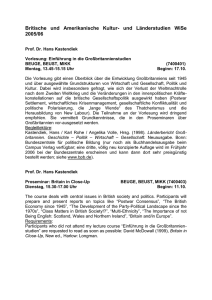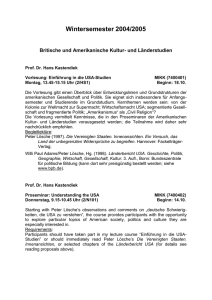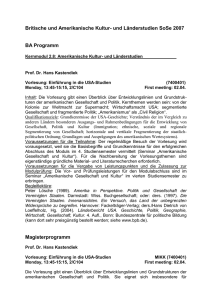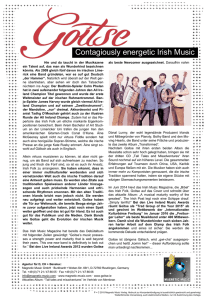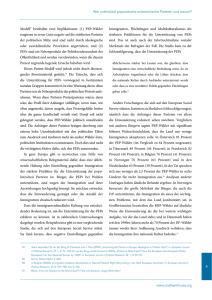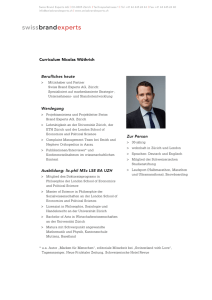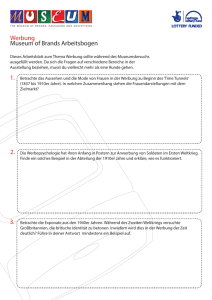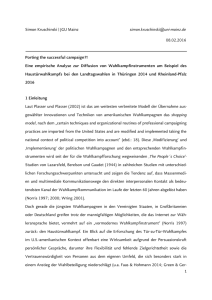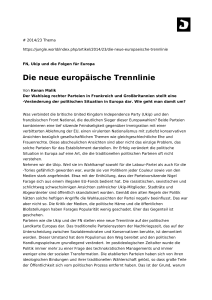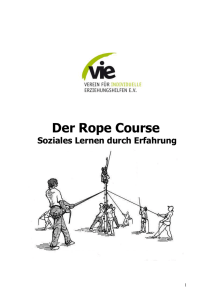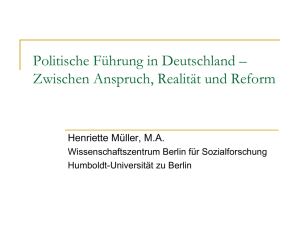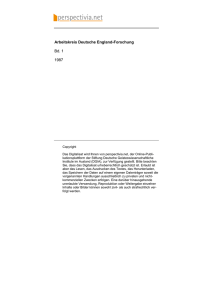Britische und Amerikanische Kultur
Werbung
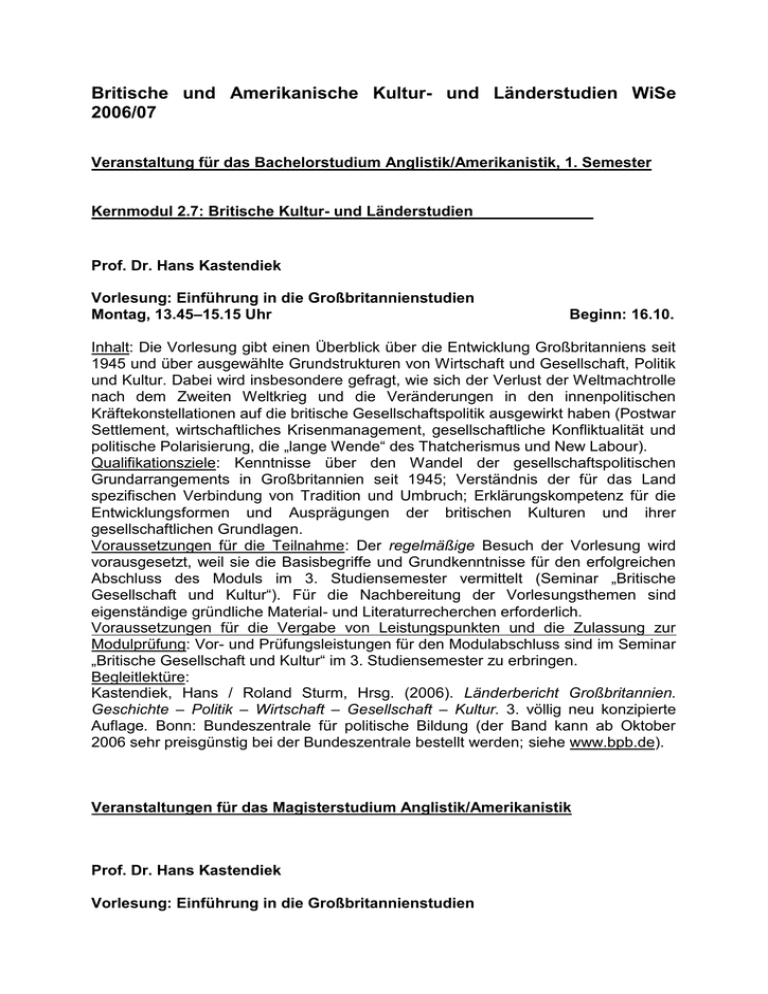
Britische und Amerikanische Kultur- und Länderstudien WiSe 2006/07 Veranstaltung für das Bachelorstudium Anglistik/Amerikanistik, 1. Semester Kernmodul 2.7: Britische Kultur- und Länderstudien Prof. Dr. Hans Kastendiek Vorlesung: Einführung in die Großbritannienstudien Montag, 13.45–15.15 Uhr Beginn: 16.10. Inhalt: Die Vorlesung gibt einen Überblick über die Entwicklung Großbritanniens seit 1945 und über ausgewählte Grundstrukturen von Wirtschaft und Gesellschaft, Politik und Kultur. Dabei wird insbesondere gefragt, wie sich der Verlust der Weltmachtrolle nach dem Zweiten Weltkrieg und die Veränderungen in den innenpolitischen Kräftekonstellationen auf die britische Gesellschaftspolitik ausgewirkt haben (Postwar Settlement, wirtschaftliches Krisenmanagement, gesellschaftliche Konfliktualität und politische Polarisierung, die „lange Wende“ des Thatcherismus und New Labour). Qualifikationsziele: Kenntnisse über den Wandel der gesellschaftspolitischen Grundarrangements in Großbritannien seit 1945; Verständnis der für das Land spezifischen Verbindung von Tradition und Umbruch; Erklärungskompetenz für die Entwicklungsformen und Ausprägungen der britischen Kulturen und ihrer gesellschaftlichen Grundlagen. Voraussetzungen für die Teilnahme: Der regelmäßige Besuch der Vorlesung wird vorausgesetzt, weil sie die Basisbegriffe und Grundkenntnisse für den erfolgreichen Abschluss des Moduls im 3. Studiensemester vermittelt (Seminar „Britische Gesellschaft und Kultur“). Für die Nachbereitung der Vorlesungsthemen sind eigenständige gründliche Material- und Literaturrecherchen erforderlich. Voraussetzungen für die Vergabe von Leistungspunkten und die Zulassung zur Modulprüfung: Vor- und Prüfungsleistungen für den Modulabschluss sind im Seminar „Britische Gesellschaft und Kultur“ im 3. Studiensemester zu erbringen. Begleitlektüre: Kastendiek, Hans / Roland Sturm, Hrsg. (2006). Länderbericht Großbritannien. Geschichte – Politik – Wirtschaft – Gesellschaft – Kultur. 3. völlig neu konzipierte Auflage. Bonn: Bundeszentrale für politische Bildung (der Band kann ab Oktober 2006 sehr preisgünstig bei der Bundeszentrale bestellt werden; siehe www.bpb.de). Veranstaltungen für das Magisterstudium Anglistik/Amerikanistik Prof. Dr. Hans Kastendiek Vorlesung: Einführung in die Großbritannienstudien BEUGE, BEUST, MIKK Montag, 13.45–15.15 Uhr (7400401) Beginn: 16.10. Die Vorlesung gibt einen Überblick über die Entwicklung Großbritanniens seit 1945 und über ausgewählte Grundstrukturen von Wirtschaft und Gesellschaft, Politik und Kultur. Dabei wird insbesondere gefragt, wie sich der Verlust der Weltmachtrolle nach dem Zweiten Weltkrieg und die Veränderungen in den innenpolitischen Kräftekonstellationen auf die britische Gesellschaft ausgewirkt haben (Postwar Settlement, wirtschaftliches Krisenmanagement, gesellschaftliche Konfliktualität und politische Polarisierung, die „lange Wende“ des Thatcherismus und New Labour). Die Teilnahme an der Vorlesung wird dringend empfohlen. Sie vermittelt Grundkenntnisse, die in den Proseminaren über Großbritannien vorausgesetzt werden. Begleitlektüre: Kastendiek, Hans & Roland Sturm, Hrsg. (2006). Länderbericht Großbritannien. Geschichte – Politik – Wirtschaft – Gesellschaft – Kultur. 3., völlig neu konzipierte Auflage. Bonn: Bundeszentrale für politische Bildung (der Band kann ab Oktober sehr preisgünstig bei der Bundeszentrale bestellt werden; siehe www.bpb.de). Prof. Dr. Hans Kastendiek Proseminar: Understanding the USA Donnerstag, 9.15–10.45 Uhr MIKK* (7400402) Beginn: 12.10. Starting with Peter Lösche’s observations and comments on „deutsche Schwierigkeiten, die USA zu verstehen“, the course provides participants with the opportunity to explore particular topics of American society, politics and culture they are especially interested in. Requirements: Participants who did not take part in my lecture course “Einführung in die USAStudien” should immediately read Peter Lösche (1997). Die Vereinigten Staaten. Innenansichten. Ein Versuch, das Land der unbegrenzten Widersprüche zu begreifen. Hannover: Fackelträger-Verlag. Further Reading: Selected chapters of Peter Lösche & Hans Dietrich von Loeffelholz, Hrsg. (2004). Länderbericht USA. Geschichte, Politik, Geographie, Wirtschaft, Gesellschaft, Kultur. 4th ed. Bonn: Bundeszentrale für politische Bildung (kann dort sehr preisgünstig bestellt werden; siehe www.bpb.de). * Unfortunately, there are only a few places available for students enrolled in MIKK. Susan Nitzsche, M.A. Proseminar: Changing Ireland – From Emigration to Immigration BEUGE, BEUST* (7400403) Donnerstag, 13.45-15.15 Uhr Beginn: 12.10. For centuries, emigration had been a persistent feature of Irish society. Since the mid-1990s, however, there has been a steady flow of people coming to Ireland. Between 1995 and 2000, about 250,000 people migrated to the Republic of Ireland – almost 7 per cent of the Republic’s 1996 population. Formerly a country of emigration, Ireland has turned into an immigration country. This course aims at offering students an overview of Irish emigration history and of the recent phenomenon of immigration. In the first part of the seminar, we will concentrate on the waves of Irish emigration since the 18th century and on the push and pull factors responsible for them. Additionally, we will have a closer look at the Irish communities abroad. We will analyse the situation of Irish immigrants in the USA and Britain and discuss the concept of an Irish diaspora. Before turning to immigration, we will deal with the dramatic economic and social changes in the Republic of Ireland in the last 25 years. Our main emphasis will be on the extraordinary economic growth, referred to as the ‘Celtic Tiger’, because it is the main factor that makes Ireland attractive to migrants. Regarding Ireland as a country of immigration, we will investigate the legal framework that regulates immigration; focus on the different immigrant groups and their situation in Ireland; and – last but not least – ask how the Republic of Ireland copes with issues such as racism and integration. Recommended reading: Bielenberg, Andy (2000). The Irish Diaspora. Harlow etc.: Longman. Fanning, Bryan (2002). Racism and Social Change in the Republic of Ireland. Manchester: Manchester University Press. * Unfortunately, there are only a few places available for students enrolled in BEUGE and BEUST. Dr. Sebastian Berg Proseminar: Britain since 1945 Freitag, 9.15-10.45 Uhr BEUGE, BEUST, MIKK* (7400404) Beginn: 13.10. Why did Margaret Thatcher call Britain a ‘nanny state’ and want to ‘set the people free’ in the 1980s? Why did the Blair government – in contrast to the governments in Berlin and Paris – follow the US into the Iraq war in 2003? Why did people in Scotland and Wales vote against having their own parliaments or assemblies in 1979 but decide differently in 1997? Why is ‘multiculturalism’ often declared ‘dead’ these days by people who have once pursued it? Why is it easier to distinguish between ‘being Scottish’ and ‘being British’ than between ‘being English’ and ‘being British’? These are some of the questions we will analyse and discuss in this course. To do so, we must look into recent history, explaining specific phenomena in the context of developments over the last 60 years. We will also talk about the purpose and the techniques of academic work. This will assist you in presenting a paper and writing a Hausarbeit on a topic you are particularly interested in. Recommended reading: There are two books which approach similar phenomena from different angles, the first focusing on institutions and history, the second on public debates and the expression of identity: Oakland, J. (2006). British Civilization. An Introduction. 6th edition, London: Routledge. Morley, D. & K. Robins, eds. (2001). British Cultural Studies. Geography, Nationality, and Identity. Oxford: Oxford University Press. * Unfortunately, there are only a few places available for students enrolled in BEUGE, BEUST and MIKK. Prof. Dr. Hans Kastendiek Hauptseminar: Class in Britain Dienstag, 11.30-13.00 Uhr BEUGE, BEUST, MIKK (7400406) Beginn: 10.10. In Britain, quite in contrast to Germany, socio-economic and politico-cultural matters are still seen as class matters. Hence, in academic as well as in public discourse, the terms “class” and “class society” are widely used, and many authors, such as – for example – Andrew Adonis and Stephen Pollard, argue that “Britain cannot be understood apart from its class system”. After an exploration of how the concept of “class” is defined in Britain, the course will investigate how it is applied in analysing British society. Recommended reading: Tony Bilton et al. (1987). Introductory Sociology. 2nd ed. Basingstoke: Macmillan (chapters 2 and 3, pp. 34 – 119). Nicholas Abercrombie & Alan Warde et al. (2000). Contemporary British Society. 3rd ed. Cambridge: Polity Press (chapters 5 and 6, pp. 114 – 191). Andrew Adonis & Stephen Pollard (1997). A Class Act. The Myth of Britain’s Classless Society. London: Hamish Hamilton. (These and further texts will be available at our Archiv Kultur- und Länderstudien, Rh. 39, room 216) Dr. Sebastian Berg Hauptseminar: The American Political Tradition BEUGE, BEUST, MIKK Donnerstag, 13.45-15.15 Uhr (7400407) Beginn: 12.10. The ‘founding fathers’ of the United States explicitly based the political system they built on the principle of equality. But today, the country is one of the most unequal among advanced industrialized societies. Whole groups of people were (and are?) excluded from political decision making or marginalized within society. Nevertheless, they often referred (and refer) to American political values in their attempts at getting heard. Those who supported going to war in the recent past claimed to act according to the spirit of America’s political tradition, as did many of those who were opposed. The centrality of the political tradition for public debate calls for a deeper look into its basics and variations. Hence, in this course we will discuss and analyse important texts from past and present, dealing with what American politics is, and should be, about – and how these questions influence political institutions and decisions. This means: be prepared to read and to debate questions dealing with politics, but maybe also with values, norms, ideas, ideals, visions, utopias, ethics! Those who want to receive a Leistungsschein should present a paper in course and write a Hausarbeit. A reader with key texts will be provided in the first session. Prof. Dr. Hans Kastendiek Examenskolloquium: Studienschwerpunkt (Abschlussprüfungen) Dienstag: 15.30–17.00 Uhr Kultur- und Länderstudien (7400408) Beginn: 10.10. Die Veranstaltung richtet sich an StudentInnen im Hauptstudium, die die Britischen und Amerikanischen Kultur- und Länderstudien als Studienschwerpunkt gewählt und das Abschlussexamen ins Auge gefasst haben oder bereits „mitten drin“ sind. Sie versteht sich nicht als ein „Examenskolloquium“ im Sinne eines „Repetitoriums“ zentraler Inhalte des Studiums zur Vorbereitung auf die Klausuren und die mündlichen Prüfungen. Vielmehr soll es um eine Verständigung über den Studienund Prüfungsschwerpunkt Kultur- und Länderstudien und nicht zuletzt auch um ganz praktische Fragen der Abschlussprüfung gehen: Strategien der Themenwahl für die Magisterarbeit; von der ersten Themenidee zur Themenvergabe; von der zentralen Problem- und Fragestellung zum Untersuchungsplan; zum richtigen Lesen; vom Lesen zum Schreiben; zum Umgang mit Arbeitskrisen; technische Fragen zur Magisterarbeit (Belegtechnik, Bibliographie, Layout etc.); „Lebensabschnitt Magisterarbeit?“ (Berichte von AbsolventInnen).
